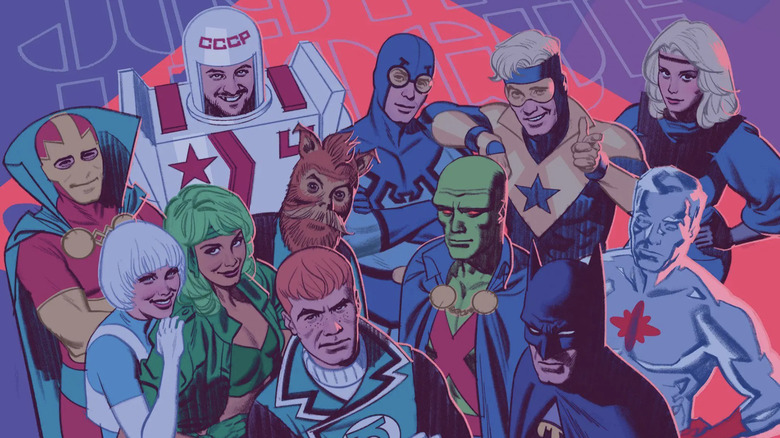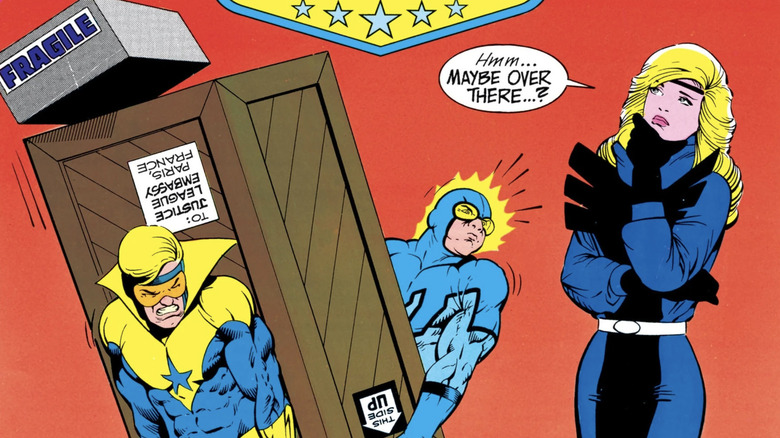James Gunn's DC Universe Continues Adapting The Funniest Justice League Ever
We may receive a commission on purchases made from links.
The latest revealed DC Studios television project is a "Booster Gold" TV show from David Jenkins (creator of "Our Flag Means Death"), which has been ordered to pilot at HBO Max (per Deadline). Booster Gold (created by Dan Jurgens in 1986), aka Jon Michael Carter, is a time-traveling superhero from the future. Though he hails from the 25th century, his story is familiar: he's a jock who peaked in high school (being caught gambling on your own games will do that to you). So, he travels back in time in hope of becoming a big fish in a smaller pond.
Though Booster is dense and a self-promoting gloryhound, he's not a bad guy. He's similar to James Gunn's take on Peter Quill/Star-Lord and so should fit naturally into Gunn's new DC Universe if his pilot moves forward. "Booster Gold" isn't the only DCU TV show in the works, either.
DC Studios has greenlit an animated series based on the character Mister Miracle, and live-action series "Lanterns" arrives on HBO in early 2026. The latter will feature the Green Lantern Guy Gardner (Nathan Fillion), who previously appeared in "Superman." Guy is part of the "Justice Gang," a group of heroes funded by the wealthy Max Lord (Sean Gunn). The Gang is likely to get a rebrand to the Justice League... specifically, I bet, the Justice League International, the team co-created in 1987 by writers J.M. DeMatteis & Keith Giffen and artist Kevin Maguire.
The JLI's line-up was fluid, but essential characters included Max Lord (who brought the team together in his role as an agent of the United Nations), Blue Beetle, Booster Gold, Fire & Ice, Guy Gardner, Mister Miracle and his wife Big Barda, Black Canary, Batman, and Martian Manhunter (the last two were the team's straight men). Back when we got our first look at Fillion's Guy Gardner in the "Superman" trailer last December, I wrote how Gunn using Guy and Max Lord suggested that he's pulling from "Justice League International." Booster Gold and Mister Miracle entering the DCU adds evidence to the pile. So does Gunn outright saying Kevin Maguire's work has influenced the DCU.
What sets the JLI apart from other Leagues? "Justice League International" has been described as more of a workplace comedy about superheroes than a typical adventure series, and it leaned into the humor more and more as it went on. Knowing what Gunn loves about superheroes, reading the "Justice League International" comics could provide some insight into his plans for the DCU.
Justice League International was a motley crew of superheroes
In 1986, DC Comics rebooted their sprawling, decades-long continuity after the event mini-series "Crisis on Infinite Earths" by Marv Wolfman and George Pérez. Characters and books were relaunched with fresh starts and more modern sensibilities. John Byrne rebooted Superman (another influence on Gunn), Frank Miller carried the torch from "The Dark Knight Returns" to "Batman: Year One," and the aforementioned Pérez made Wonder Woman soar again.
Meanwhile, Giffen, DeMatteis, and Maguire were assigned by editor Andy Helfer to make the new "Justice League" — which was an unexpected hit; "I thought we were doomed," Giffen said many years later on a panel with DeMatteis. You may notice that the only household name among the JLI is Batman, but the book turned what should've been a weakness into a strength. DeMatteis recounted to FandomWire in 2021:
"The initial line-up was dictated by DC editorial. We had no voice in it at all. It worked out to our advantage that, for the most part, we got a group of characters that were viewed as second-stringers, because that gave us license to make them our own. To imprint them with our unique POV."
The result was an electric (and eccentric) ensemble of characters who didn't get along. The strait-laced Batman and feminist Black Canary scrape against the bullheaded pig Guy Gardner. Blue Beetle and Booster Gold, both scrappy underdogs largely dismissed by their teammates, form a dynamic duo of strivers. (One time, they even opened a casino together... and failed miserably.)
If there's any comic book writer whom James Gunn most echoes, it's Giffen & DeMatteis writing the Justice League. DeMatteis' quote about making "second stringer" characters into their own? Gunn did that over at Marvel with the Guardians of the Galaxy. The contemporary "Guardians" comics were a more serious space opera about a bunch of war veterans trying to keep the peace. Gunn turned that story, and its obscure lead characters, into an offbeat but emotionally honest action-comedy about a-holes and weirdos finding their place together. The result? The Guardians of the Galaxy are now on the A-list roster of Marvel Comics.
Like the Post-Crisis comics of the late 1980s, Gunn's DCU is coming off of a previous DC universe ending. Giffen, DeMatteis, and Maguire embraced a new tone as a storytelling rejuvenation, and Gunn is following in their footsteps.

